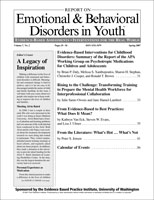Social Skills Training for Youth With Disruptive Behavior Disorders: A Review of Best Practices
Author: Amori Yee Mikami, Ph.D..; Linda J. Pfiffner, Ph.D..
Source: Volume 06, Number 01, Winter 2006 , pp.3-8(6)

next article > |return to table of contents
Abstract:
It is difficult to overstate the peer relations problems experienced by children with disruptive behavior disorders (DBDs). In particular, an overwhelming body of evidence documents that at least half of children with attention deficit hyperactivity disorder (ADHD) are rejected by their peers, compared to 15% of children without ADHD. Children with ADHD and comorbid aggressive behavior are the most rejected, but interestingly, aggressive behavior alone, without ADHD, is not always associated with unpopularity. There is also compelling evidence that children with DBDs do not “grow out of” their peer relations problems and that difficulties persist into adolescence and young adulthood.Keywords:
Affiliations:
1: University of Virginia; 2: Department of Psychiatry, University of California, San Francisco.